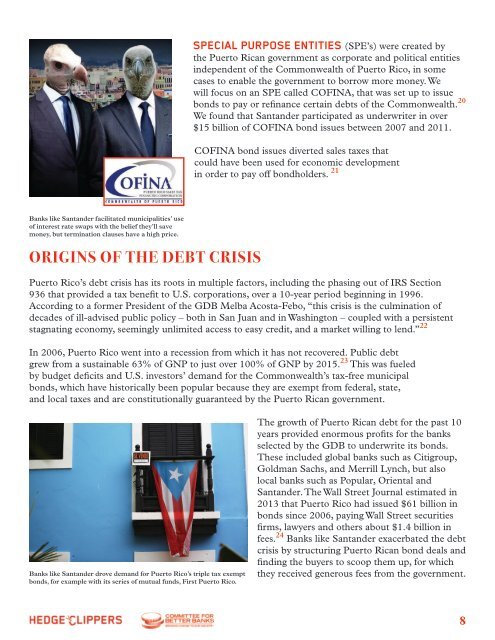PIRATES OF THE CARIBBEAN
20161025_HedgeClippers_ReportPR_v3-3
20161025_HedgeClippers_ReportPR_v3-3
Create successful ePaper yourself
Turn your PDF publications into a flip-book with our unique Google optimized e-Paper software.
SPECIAL PURPOSE ENTITIES (SPE’s) were created by<br />
the Puerto Rican government as corporate and political entities<br />
independent of the Commonwealth of Puerto Rico, in some<br />
cases to enable the government to borrow more money. We<br />
will focus on an SPE called C<strong>OF</strong>INA, that was set up to issue<br />
bonds to pay or refinance certain debts of the Commonwealth. 20<br />
We found that Santander participated as underwriter in over<br />
$15 billion of C<strong>OF</strong>INA bond issues between 2007 and 2011.<br />
C<strong>OF</strong>INA bond issues diverted sales taxes that<br />
could have been used for economic development<br />
in order to pay off bondholders. 21<br />
Banks like Santander facilitated municipalities’ use<br />
of interest rate swaps with the belief they’ll save<br />
money, but termination clauses have a high price.<br />
ORIGINS <strong>OF</strong> <strong>THE</strong> DEBT CRISIS<br />
Puerto Rico’s debt crisis has its roots in multiple factors, including the phasing out of IRS Section<br />
936 that provided a tax benefit to U.S. corporations, over a 10-year period beginning in 1996.<br />
According to a former President of the GDB Melba Acosta-Febo, “this crisis is the culmination of<br />
decades of ill-advised public policy – both in San Juan and in Washington – coupled with a persistent<br />
stagnating economy, seemingly unlimited access to easy credit, and a market willing to lend.” 22<br />
In 2006, Puerto Rico went into a recession from which it has not recovered. Public debt<br />
grew from a sustainable 63% of GNP to just over 100% of GNP by 2015. 23 This was fueled<br />
by budget deficits and U.S. investors’ demand for the Commonwealth’s tax-free municipal<br />
bonds, which have historically been popular because they are exempt from federal, state,<br />
and local taxes and are constitutionally guaranteed by the Puerto Rican government.<br />
Banks like Santander drove demand for Puerto Rico’s triple tax exempt<br />
bonds, for example with its series of mutual funds, First Puerto Rico.<br />
The growth of Puerto Rican debt for the past 10<br />
years provided enormous profits for the banks<br />
selected by the GDB to underwrite its bonds.<br />
These included global banks such as Citigroup,<br />
Goldman Sachs, and Merrill Lynch, but also<br />
local banks such as Popular, Oriental and<br />
Santander. The Wall Street Journal estimated in<br />
2013 that Puerto Rico had issued $61 billion in<br />
bonds since 2006, paying Wall Street securities<br />
firms, lawyers and others about $1.4 billion in<br />
fees. 24 Banks like Santander exacerbated the debt<br />
crisis by structuring Puerto Rican bond deals and<br />
finding the buyers to scoop them up, for which<br />
they received generous fees from the government.<br />
8


